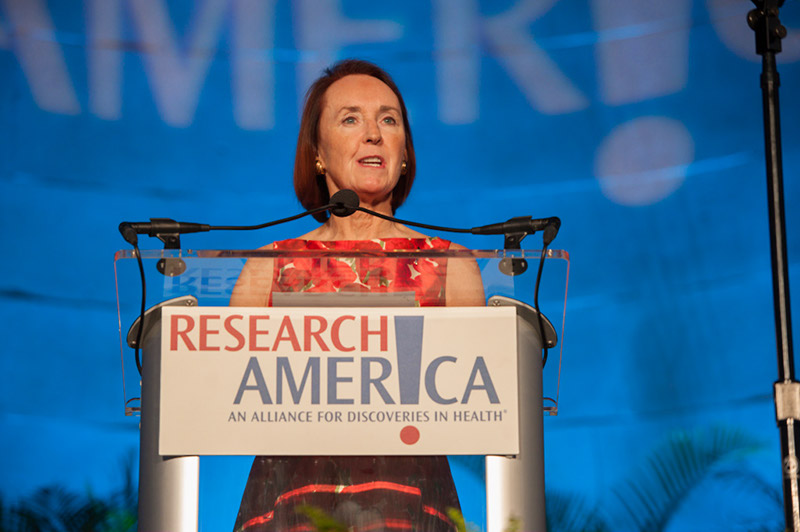Grateful for research and our advocates

 Dear Research Advocate:
Dear Research Advocate:
First, thank you! It was so meaningful to celebrate our 30th anniversary with so many of you at our annual meeting and advocacy awards dinner yesterday. It is difficult to do the day justice or fully express my gratitude for it. Check our website next week for a livestream of the annual meeting, which featured Assistant Secretary of Health and Human Services (HHS) Admiral Brett Giroir; NIH National Heart, Lung, and Blood Institute (NHLBI) Director Dr. Gary Gibbons; a candid discussion between Massachusetts Institute of Technology (MIT) President Emerita, Dr. Susan Hockfield and Seema Kumar of Johnson & Johnson; and the heartfelt story of cystic fibrosis patient and advocate Melissa Shiffman.
The advocacy awards dinner was equally exhilarating and humbling: House Appropriations Chair Nita Lowey (D-NY-17), Senator Richard Shelby (R-AL) [who was with us in spirit, but not in person due to a series of roll call votes], former Secretary of HHS Dr. Louis Sullivan, research luminaries Dr. David Williams and the aforementioned Susan Hockfield, the rules of the game-changing Cystic Fibrosis Foundation, the esteemed author Dr. Siddhartha Mukherjee, and extraordinarily impactful philanthropist Denny Sanford received awards.
Speaker of the House, Nancy Pelosi (D-CA), NIH Director Dr. Francis Collins, CDC Director Dr. Robert Redfield, NSF Director Dr. France Cordova, AHRQ Director Gopal Khanna, NIAID Director, Research!America Legacy Awardee Dr. Anthony Fauci, and NCI Director and newly appointed acting FDA Director Dr. Ned Sharpless were among the many outstanding federal leaders joining us. If you weren’t able to be part of these events in 2019, email Donna at [email protected] to be there in 2020!
As expected, the president’s budget request for FY20 was released this week, and also as expected, the cuts to non-defense discretionary (NDD) programs were significant. The proposal calls for cuts of $4.7 billion to NIH, $750 million in cuts to CDC, a nearly $200 million cut to AHRQ (which, as in previous president’s budgets, would be moved to NIH) and a $1 billion cut to NSF. FDA is spared, and in fact would be accorded a healthy increase under the proposal. Check out our statement here.
An example of why the cuts proposed by the president’s budget must stay in the realm of “proposed:” measles cases have now been confirmed in 12 states since the start of 2019. This is just one of the multitudinous threats CDC responds to as it simultaneously prevents, minimizes and fights other population health issues (opioid misuse and antimicrobial resistance, for starters). Cuts are a mistake. Increased investment is a strategic necessity. CDC was among the agencies Research!America addressed in an appropriations request letter (see text here) to all members of Congress this week.
Senator Richard Blumenthal (D-CT) is circulating a “Dear Colleague” urging his Senate colleagues to sign on to a letter in support of AHRQ funding. Similarly, Representatives Susan Davis (D-CA), David McKinley (R-WV), Andre Carson (D-IN), and Peter King (R-NY) are circulating a “Dear Colleague” urging their fellow representatives to sign on to a letter in support of NIH funding. Call your senators (re the AHRQ letter) and representatives (re the NIH letter) urging them to sign on!
The FY20 budget landscape will be one of the topics covered during our next alliance members call, featuring Laura Friedel, Senate Labor-H Subcommittee Clerk, scheduled for Wednesday, March 27 at 11:00 a.m. EDT. If your organization is a member of the Research!America alliance and you and/or colleagues would like to join the call, RSVP to Jacqueline at ([email protected]).
Finally, did you know that computers have been able to calculate the number pi to more than 31 trillion digits? I hope you’ll take some time this Pi Day to check out how Google scientist, Emma Haruka, was able to beat the previous record.
Sincerely,
Mary Woolley




